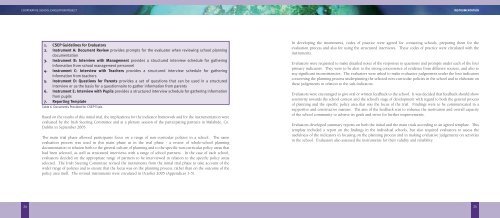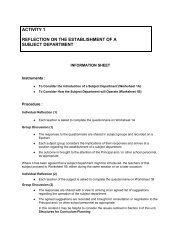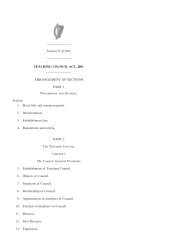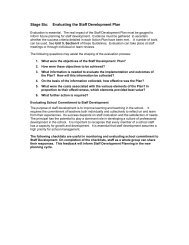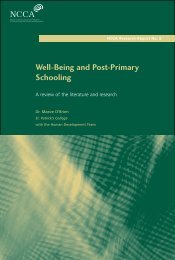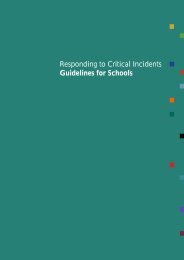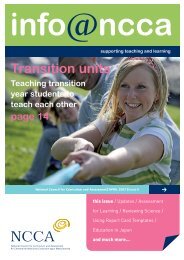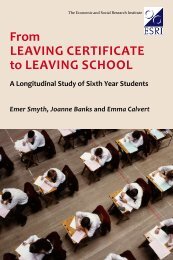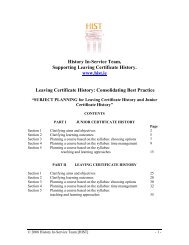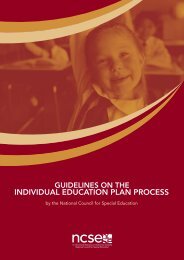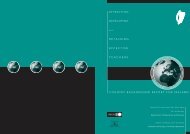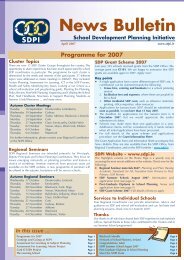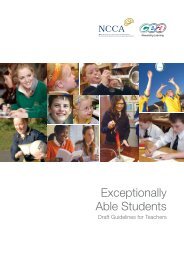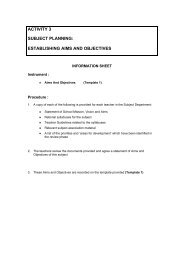Co-Operative School Evaluation Project (File Format PDF 550KB)
Co-Operative School Evaluation Project (File Format PDF 550KB)
Co-Operative School Evaluation Project (File Format PDF 550KB)
You also want an ePaper? Increase the reach of your titles
YUMPU automatically turns print PDFs into web optimized ePapers that Google loves.
COOPERATIVE SCHOOL EVALUATION PROJECT<br />
INSTRUMENTATION<br />
1. CSEP Guidelines for Evaluators<br />
2. Instrument A: Document Review provides prompts for the evaluator when reviewing school planning<br />
documentation<br />
3. Instrument B: Interview with Management provides a structured interview schedule for gathering<br />
information from school management personnel<br />
4. Instrument C: Interview with Teachers provides a structured interview schedule for gathering<br />
information from teachers<br />
5. Instrument D: Questions for Parents provides a set of questions that can be used in a structured<br />
interview or as the basis for a questionnaire to gather information from parents<br />
6. Instrument E: Interview with Pupils provides a structured interview schedule for gathering information<br />
from pupils<br />
7. Reporting Template<br />
Table 6 Documents Provided for CSEP Trials<br />
Based on the results of this initial trial, the implications for the indicator framework and for the instrumentation were<br />
evaluated by the Irish Steering <strong>Co</strong>mmittee and at a plenary session of the participating partners in Malahide, <strong>Co</strong>.<br />
Dublin in September 2005.<br />
The main trial phase allowed participants focus on a range of non-curricular policies in a school. The same<br />
evaluation process was used in this main phase as in the trial phase - a review of whole-school planning<br />
documentation in relation both to the general culture of planning and to the specific non-curricular policy areas that<br />
had been selected, as well as structured interviews with a range of school partners. In the case of each school,<br />
evaluators decided on the appropriate range of partners to be interviewed in relation to the specific policy areas<br />
selected. The Irish Steering <strong>Co</strong>mmittee revised the instruments from the initial trial phase to take account of the<br />
wider range of policies and to ensure that the focus was on the planning process, rather than on the outcome of the<br />
policy area itself. The revised instruments were circulated in October 2005 (Appendices 3-5).<br />
In developing the instruments, codes of practice were agreed for contacting schools, preparing them for the<br />
evaluation process and also for using the structured interviews. These codes of practice were circulated with the<br />
instruments.<br />
Evaluators were requested to make detailed notes of the responses to questions and prompts under each of the four<br />
primary indicators. They were to be alert to the strong concurrence of evidence from different sources, and also to<br />
any significant inconsistencies. The evaluators were asked to make evaluative judgements under the four indicators<br />
concerning the planning process underpinning the selected non-curricular policies in the school and to elaborate on<br />
these judgements in relation to the sub-indicators.<br />
Evaluators were encouraged to give oral or written feedback to the school. It was decided that feedback should show<br />
sensitivity towards the school context and the school’s stage of development with regard to both the general process<br />
of planning and the specific policy area that was the focus of the trial. Findings were to be communicated in a<br />
supportive and constructive manner. The aim of the feedback was to enhance the motivation and overall capacity<br />
of the school community to achieve its goals and strive for further improvements.<br />
Evaluators developed summary reports on both the initial and the main trials according to an agreed template. This<br />
template included a report on the findings in the individual schools, but also required evaluators to assess the<br />
usefulness of the indicators in focusing on the planning process and in making evaluative judgements on activities<br />
in the school. Evaluators also assessed the instruments for their validity and reliability.<br />
24<br />
25


